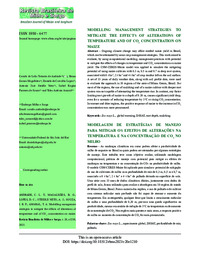Modelling management strategies to mitigate the effects of alterations of temperature and of CO2 concentration on maize.
Modelling management strategies to mitigate the effects of alterations of temperature and of CO2 concentration on maize.
Author(s): ANDRADE, C. de L. T. de; MAGALHÃES, B. G.; LOPES, D. de C.; STEIDLE NETO, A. J.; SOUZA, I. R. P. de; AMARAL, T. A.
Summary: Ongoing climate change may affect rainfed maize yield in Brazil, which can be attenuated by some crop management strategies. This work aimed to evaluate, by using computational modeling, management practices with potential to mitigate the effects of changes in temperature and CO2 concentration on maize yield. The CSM-CERES-Maize model was applied to simulate the mitigating potential of using maize cultivars with 0.3 m, 0.5 m and 0.7 m deep root system, associated with 0 t ha-1, 2 t ha-1 and 4 t ha-1 of crop residue left on the soil surface. A set of 33 years of daily weather data, along with soil profile data, were used to evaluate the approach in 10 regions of the state of Minas Gerais, Brazil. For most of the regions, the use of mulching and of a maize cultivar with deeper root system was not capable of attenuating the temperature rise. In contrast, any factor limiting root growth of maize to a depth of 0.30 m, causes significant yield drop, even for a scenario of reducing temperature by 3 oC or rising CO2 concentration. In warmer and drier regions, the positive response of maize to the increase in CO2 concentration was more pronounced.
Publication year: 2021
Types of publication: Journal article
Unit: Embrapa Maize & Sorghum
Observation
Some of Embrapa's publications are published as ePub files. To read them, use or download one of the following free software options to your computer or mobile device. Android: Google Play Books; IOS: iBooks; Windows and Linux: Calibre.
Access other publications
Access the Agricultural Research Database (BDPA) to consult Embrapa's full library collection and records.
Visit Embrapa Bookstore to purchase books and other publications sold by Embrapa.

